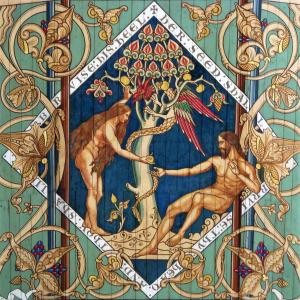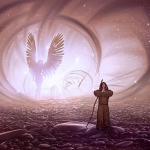
Those who engage evil present themselves as good. They embrace elements of the good, elements which, when cut off from the fullness of the good, become but dying embers of the good itself. And yet those remnants are enough for them to hide behind so as to try to appear good to others. Likewise, those following evil will present themselves as followers of the truth, using elements of the truth itself; while what they say will be false, it will appear to be true because of those remnants of the truth which they embrace. They will use many of the same ideas and teachings proclaimed by those who follow the truth, but in a fashion contrary to the truth itself. They can do this in many different ways, for example, they will equivocate when they speak. That is, those promoting evil will use the same terms as those pursuing the truth will use, but they will mean something different by them than by those whom they imitate. Thus, while it might appear, at a cursory examination of people say, they are talking about the same thing, a further examination of what they say will show the vastly different meanings intended by those words.
Thus, in the myth concerning the fall of humanity in the book of Genesis, the serpent, which many believe either represents Satan or served as a vessel of the devil, told Eve that she would not die if she ate from the tree of knowledge of good and evil. Likewise, it said that if she ate of that fruit, she would become like God, knowing good and evil:
Now the serpent was more subtle than any other wild creature that the LORD God had made. He said to the woman, “Did God say, `You shall not eat of any tree of the garden’?” And the woman said to the serpent, “We may eat of the fruit of the trees of the garden; but God said, `You shall not eat of the fruit of the tree which is in the midst of the garden, neither shall you touch it, lest you die.'” But the serpent said to the woman, “You will not die. For God knows that when you eat of it your eyes will be opened, and you will be like God, knowing good and evil.” (Gen. 3:1-5 RSV).
It would appear the serpent spoke the truth: what the serpent said would happen, happened. When Eve (and later Adam) ate of the fruit, they did not immediately suffer a physical death, and, as the serpent said they would, they received a new understanding of good and evil. Nonetheless, the serpent lied, and it did so through equivocation. They were lead to believe that they would suffer nothing as a result of eating of the fruit, and that they would become God’s equals. The death which happened to them was a spiritual death, and through it, they would eventually face a physical death; the charity which was in their souls, and the grace which came from it, was lost to them, and so they began a journey of corruption which ate away at their very being. The knowledge of good and evil they took on was one of experience, not of divine omniscience. They did not become like God through their knowledge, but rather, became even less like God because, by experiencing the consequences of evil for themselves, evil took a hold of them and corrupted them and made them less than what they were before their disobedience.
Pride, it can be said, led to their disobedience. They were led to think they could become God’s equals. They could become like God in their very nature. Then, as St. Augustine explained, they would not have to see themselves as being under, or inferior to, God:
In these words we can see it was through pride that the sin was put across – I mean, that’s the catch in the words, you will be like gods. And also with the whole assertion, for God knew that one the day you take a bite from it your eyes will be opened, what else is to be understood but a suggestion that they should refuse to be under God any longer, but should be their own masters without the Lord, that they should not keep a rule apparently laid down by him out of a jealous refusal to let them be in control of their own lives, no longer needing an inner enlightenment from him, but using their own wits, their own eyes so to say, to tell the difference between good and evil, which he had wanted to stop them doing?[1]
If they became equal to God in nature, they would no longer need to rely upon God’s grace to sustain their being. They would no longer be contingent beings. The would be infinite like God and all that God could and would offer they would already have in themselves. This is what the serpent had them believe would happen, and through its enticing, it is what they desired. They wanted independence from God, and this is what the serpent said could be theirs if they took of the fruit of the tree God had forbidden them to eat. But this could never be. Human nature could never become divine in and of itself:
Human nature, you see, did not receive the power to enjoy the state of bliss independently of God’s control, because only God is able to enjoy blessedness and bliss by his own power independently of anyone else’s control. [2]
The serpent promised deification, but he promised it as being something natural, not by grace, and in doing so, though what he offered seems similar to theosis, to what Christian teaching says can be ours through grace, it is only similar via equivocation. Accepting what the serpent told them, they tried to become like God, to be independent from God.
What the serpent offered and what the teaching of theosis presents are two different things. The serpent suggested we could become God’s equal, to be, by nature, what God is by nature. When we listen to the serpent (or Satan in and through other, similar vessels), we reject grace, and in doing so, we find our own natural powers to be limited and unsustainable; the more we try to rely upon ourselves without grace, the more we use up the good which we have without having any more good coming within to replenish it. Entropy will ensue. We will become more and more corrupted, finding ourselves edging towards but never finding annihilation. This is what evil does to us. It corrupts and destroys the good it finds; to know evil in this way is to know corruption and decay, to find ourselves experiencing a living death.
The Christian teaching of theosis, on the other hand, says we will become like God, not in our nature, but by grace; that is, in and through grace, we will experience eternal life and the glory of God for ourselves. We will find that grace sustains us throughout eternity. That is, through grace, we will not experience the corruption of entropy. Instead, we will know the glory of the kingdom of God. We will experience and participate in the divine life. This, moreover, is how and why we can be said to be gods. It is not that our nature will be the divine nature, but rather, we will participate in and experience the divine life for ourselves, sharing in it due to God’s unfathomable self-giving love. The Satanic perversion of this teaching suggests we are to be gods, not through partaking of the divine nature and what it offers, but by being independent from it
This is why what Christianity offers and what serpent offered Adam and Eve are not the same thing, though it might seem at a glance that they are. The serpent lied, but in doing so, it used many of the same words those who follow the truth would use, but it did so with a different intention. The meaning of his words differs from the meaning implied by the Christian teaching of theosis. The lie seeks to make us believe that we can be gods by nature, that we do not need to partake of the divine nature but rather, we can be independent from it and so be a god unto ourselves for ourselves. However, if we follow this route, we will find, the further we are from grace, the more we make for ourselves our own private hell. The truth, on the other hand, would have us open up to grace, to participate in the divine life, and through it, find ourselves growing in grace, experiencing greater and greater things through our union with God. We are called to partake of the divine nature, to participate in the divine life, to become gods by grace, not by nature, that is, to be adopted children of God. But this is exactly what the serpent would have had us reject and so, though the serpent might appear to offer us the same end as theosis, in reality, the ends of the two are as far apart as night is from day.
[1] St. Augustine, “On Genesis: A Refutation of the Manichees” in On Genesis. Trans. Edmund Hill, OP, Michael Fiedrowics, and Matthew O’Connell. Ed. John E. Rotelle, OSA (Hyde Park, NY: New City Press, 2006), 86.
[2] St. Augustine, “On Genesis: A Refutation of the Manichees,” 86.
Stay in touch! Like A Little Bit of Nothing on Facebook.
If you liked what you read, please consider sharing it with your friends and family!












